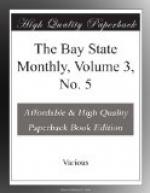At last Elizabeth paused. She drew a little nearer her father, and laid her hand upon the table beside him. “I want you to advise me;” she said; then, “What must I do?”
In the impossibility of any answer he felt a sudden rebound from the force of her words. “I don’t see that there is anything for you to do, or for anybody,” he said. “How can you act upon a thing that is purely an assumption, and not only that, but a thing so wicked that it is a cruelty to a man to imagine it about him? I can’t believe that it’s necessary to do anything, for I can’t bring myself to feel as you do. Are you very sure that you have not fancied a part of this?”
“Father!” cried Elizabeth, “I wish I had, But look at it.” And she went again over the grounds of her suspicions, giving with a clearness that he was proud of, the indications that she had seen of the bent of Edmonson’s will and the evidences of his headstrong character, linking one trifling act or word to another, until she had welded a chain so strong that Mr. Royal felt a thrill run through him as he listened, for she awoke in him her own belief and something of her own anxiety to be doing. So that when she had finished, instead of repeating that it was not necessary to do anything, he asked whom she had thought of as the person to give the warning to Archdale.
She was about to speak, then checked herself, hesitated, and at last said, “I want you to advise me.”
“Um!” said Mr. Royal, and was silent. He was somewhat disappointed that she, so powerful in statement, should have no suggestion to offer in a matter that puzzled him the more, the more he thought of it. Such a warning would not be easy to give under the most favorable circumstances. It would not be a pleasant task to tell a man that another man had designs upon his life, and when such assertion had only the proof of strong conviction and of evidence, trivial in its details, strong only as a whole, it




